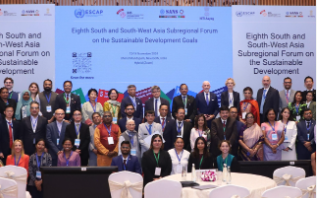8th South and South-West Asia Subregional Forum
India is making important strides in promoting decent work and economic growth. Recent discussions at the Eighth South and South-West Asia Subregional Forum on SDGs brought into light the country’s commitment to inclusive economic development. This forum was co-hosted by NITI Aayog and UN ESCAP. The Secretary of the Ministry of Labour and Employment, Ms. Sumita Dawra, chaired the session, emphasizing key initiatives and progress.
Economic Growth and Poverty Alleviation
India’s GDP growth is projected at 7% for FY 2024-25. This growth is attributed to effective poverty alleviation programs. Approximately 250 million people have moved out of multidimensional poverty in recent years. The government’s focus on inclusive growth is yielding positive results.
India has improved its social protection coverage. The ILO’s World Social Protection Report 2024-26 indicates that India has doubled its coverage estimates. The Targeted Public Distribution System is identified as one of the world’s largest legally binding social assistance schemes. It provides food security to about 800 million people.
Employment Trends and Statistics
Recent data shows a decrease in the unemployment rate from 6% in 2017-18 to 3.2% in 2022-23. Concurrently, the employment rate rose from 46.8% to 56% in the same period. Growth in the service sector and industries such as construction and logistics has driven job creation.
Formalisation of the Labour Market
Over 64 million net subscribers have joined the Employees’ Provident Fund Organization in the last six years. The 2024-25 Budget introduced Employment Linked Incentive (ELI) schemes. These initiatives aim to create quality employment and support first-time employees and rejoinees.
India is leveraging technology to improve labour market efficiency. The National Career Service (NCS) portal connects job seekers with employers. The e-Shram portal has registered over 300 million workers in the unorganised sector. It provides access to social security and welfare benefits.
Labour Law Reforms
India has consolidated 29 labour laws into four simplified codes. These reforms aim to enhance working conditions and productivity. They also provide better social security for gig and platform workers, ensuring comprehensive coverage.
India is enhancing international cooperation through its G20 presidency. Collaborations with organisations like ILO and OECD aim to develop frameworks for skill recognition. This initiative will facilitate cross-border labour mobility, promoting decent work practices globally.
The Secretary brought into light India’s potential for transformative growth in the employment sector. The focus on demographic advantages positions India as a key player in the global workforce. The government’s proactive measures are set to enhance the employment landscape .
Important Facts for Exams:
- SDG 8: Sustainable Development Goal 8 promotes inclusive and sustainable economic growth. It aims to achieve full and productive employment and decent work for all women and men.
- e-Shram: e-Shram is India’s digital platform for unorganised sector workers. It provides social security access and welfare benefits. Over 300 million workers are registered on this platform.
- NITI Aayog: NITI Aayog is the policy think tank of the Government of India. It aims to encourage cooperative federalism and drive sustainable development across states through innovative ideas.
- Targeted Public Distribution System: This system is one of the world’s largest legally binding social assistance schemes. It provides food security to approximately 800 million people across India.
Month: Current Affairs - November, 2024
Category: Government Schemes Current Affairs


